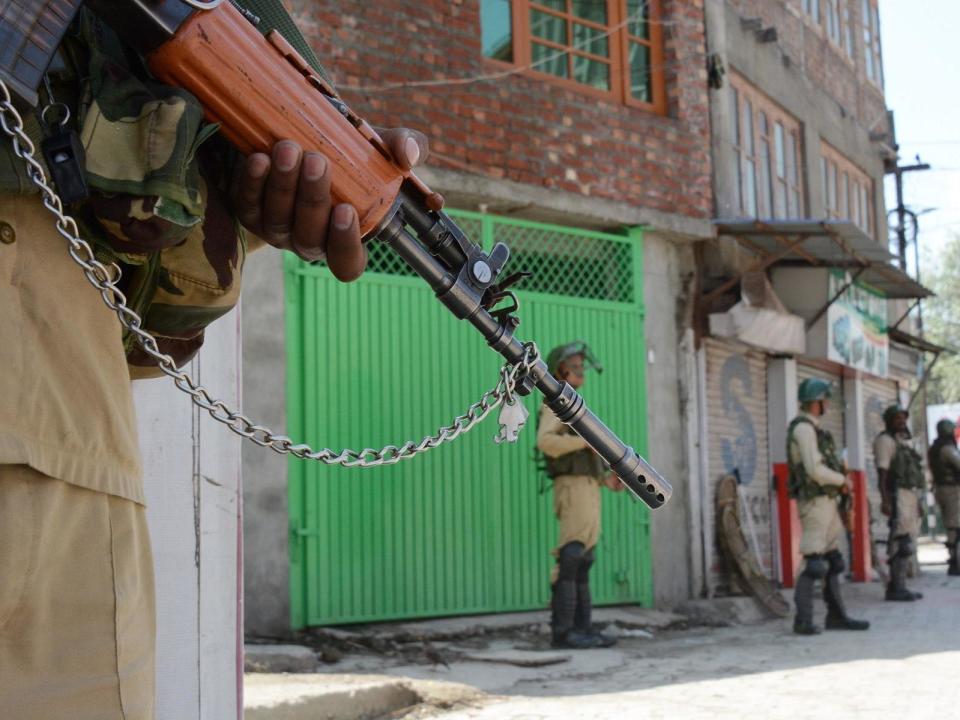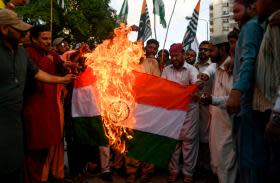For a brief period before the Kashmir crisis, humanity in the subcontinent trumped propaganda – not anymore

A decade ago, slipping into the Orientation Hall on a wet Autumn morning at Oxford, I was relieved to find I wasn’t the only one late. “We’re working Indian Standard Time,” a voice whispered. “Fashionably late.” It belonged to a boy from Delhi.
We both laughed at the inside joke that only people hailing from the subcontinent understood. “I’m from Pakistan,” I clarified. “Same difference!” he responded. Instantly, I knew we’d become fast friends. That’s exactly how it happened and a few months down, we began a blog called “Daal (lentils) and Kalashnikovs” – mirroring the puzzling, paradoxical affair between our homelands. Later, when I moved out of Pakistan, whenever we wanted a desi omelette or had to explain my vinegar allergy at a restaurant, my husband requested for an Indian server. “They get us.” Chalking our dietary idiosyncrasies in shared dialect always proved simpler. After all, 73 years ago, India and Pakistan weren’t ruptured countries.
The partition of the subcontinent often felt like siblings wrangled by an acrimonious divorce; shared languages, festivals, attires, spices, music, folklore. Of course, government machinery, education syllabi, and state media were still characterized by rancor, peddling inimical vitriol – particularly, the Kashmir crisis. The countries went to war multiple times and the situation remained more cantankerous than cordial. However, listening about Kashmir on the 9 o’clock news bulletin on Pakistan State Television, audiences could disentangle political posturing from human dialogue.
Despite state propaganda, people-to-people relationships – cross-border collaborations in cinema, music, art and literature – remained relatively intact, reducing the probability of venomous ideology turning personal, all-consuming and internalised. When Pakistani actor Fawad Khan's fan following took unprecedented flight in India, it felt like an instance when humanity could easily trump closed-door political agendas.
In recent times, however, the trend began shifting. Following the Pulwama incident, Balakot airstrikes, olive branches extended and accepted, only to be later dismissed, the narrative of discord was steadily brewing. On 5 August, when India’s home minister proposed the revocation of Article 370 of the Indian Constitution, the tipping point appeared. The act reorganises the State of Jammu and Kashmir into two Union territories; the first, Jammu and Kashmir, will be directly governed by the government in New Delhi. Its locally elected legislative assembly will remain but with abridged powers. Ladakh, the second territory, will be overseen directly by New Delhi, without a legislative assembly. The decision also removes the special status previously granted to Kashmir — including its right to maintain its own constitution and raise its own flag.
In an era where tweets create newspaper headlines, such an announcement set virtual smokescreens ablaze. From celebrities to people on the street, the anger on both sides has become unstoppable. This shift in the “common man’s” sentiment – from friendship and familiarity to estrangement and loathing – feels frighteningly palpable. Undercurrents of opposition exist historically, but were mostly restricted to cricket matches – the high-octane Sharjah ones especially. This latest decision has let the genie out of the bottle, turning large populations into sinister agents of war.
Read more
Kashmir on lockdown after India reimposes curfew and deploys troops
Actors, sportspersons, anchors, serving as role models, influencers and opinion-makers, also find themselves entangled in the ghastly political fabric, compelled to publicly record loyalties. Reproducing their calcified, mud-slinging patriotism, are throngs of virtual fans. It feels like a solemn departure from the days of cricketing superstars Miandad and Gavaskar's friendly banter on the field: amusing but never resorting to sledging.
Amidst the stirring of war hysteria – irrespective of which flag stripes one supports – a haunting case-fact gets neglected: when both nations boast nuclear muscle, power-play changes. Typical notions of “strong” and “weak” become complicated and there’s mutually assured destruction.
With over 1.5 billion people (one-fourth of humanity) involved, the stakes aren’t confined to two armies or two governments. The Twitterati brigade – celebrities included – must take stock of the colossal scale of such a catastrophic outcome.
The brisk downward spiralling of human relationships on both sides doesn’t feel unlike tragedy. Each time I log on to my social media accounts, I arm myself for the chilling language of “othering” being pounded ubiquitously. Amidst rising global inequality, it reinforces the trend of tapping into latent insecurities of the masses – economic woes especially, camouflaged by amplifying other fault lines.
http://players.brightcove.net/624246174001/default_default/index.html?videoId=6037072682001
Independent Minds Events: get involved in the news agenda
In two countries which are ranked 103rd (Pakistan) and 106th (India) on the Global Hunger Index respectively, such distractions appear reckless, misplaced, not to mention the dangerous long-term trend they signal. Such propaganda, if allowed to fester, will be difficult to reverse. Wounded attachments will prevail long after the frenzy of vote-gathering and jingoism subsides, manifesting in ways that remain agnostic to political parties and governments.
Yet, not all is lost. Last weekend, an Indian server was allocated to our table at the Cheesecake Factory. My girls sported t-shirts with “Pakistan” written in oversized letters. Before laying the menus in front of us and rattling off the specials, the server shook my hand vigorously, met my eye and spoke: “Ma’am, India-Pakistan log (people): same, same.” I couldn’t decide whether her innocence and compassion – in a world fast-moving towards normalizing hatred – filled me with heartbreak or hope.
Saba Karim is author of the forthcoming novel Skyfall and works at New York University’s global campus in Abu Dhabi
Farrukh Karim Khan works in Pakistan’s capital markets as a portfolio manager
Read more
Read more Kashmir on lockdown after India reimposes curfew and deploys troops

 Yahoo News
Yahoo News 
